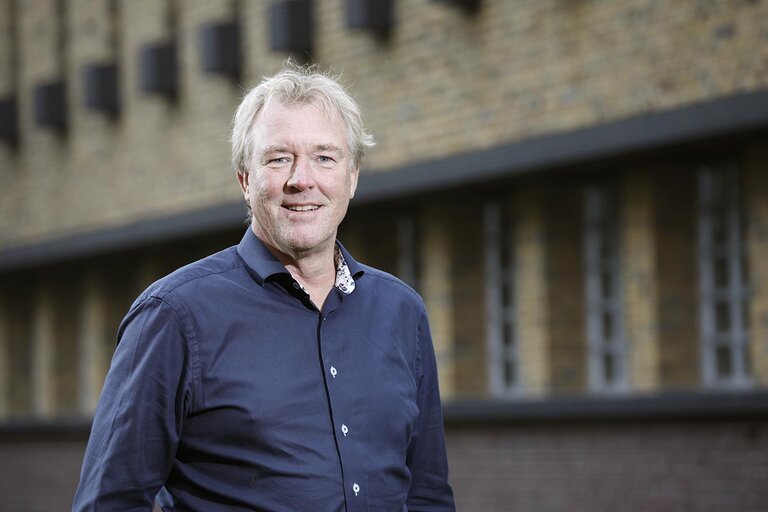
ISPT Director Tjeerd Jongsma: 'The Netherlands as international sustainability testing ground, then export our knowledge'
'The heavy industry is going green and we are pushing for that,' says Tjeerd Jongsma, director of the Institute of Sustainable Process Technology (ISPT). 'Continuing with the current methods and existing techniques will not achieve a CO2-neutral, circular economy in 2050. ISPT connects stakeholders from different sectors and disciplines to accelerate innovations and drive the sustainability transition.'
Some 15 years ago, a number of large corporations including AKZO, DOW, DSM, Unilever, Shell and Friesland Campina - where Jongsma was director of corporate research - decided to establish the institute. Since then, a multitude of companies have joined the non-profit organization. 'We provide an environment in which universities, knowledge institutions and companies can collaborate in confidence on innovations.'
Plastic
'Take the plastic chain,' says Jongsma. 'To make that chain circular, you have to bring the producer and the waste processor together. The ISPT facilitates that they can exchange their challenges and experiences. One success in that area is that the Circular Plastics Initiative (CPI), an initiative of the Dutch knowledge institute DPI and ISPT, recently released its roadmap.' The roadmap, developed in collaboration with experts from industry and academia, not only outlines a vision of the future but also shows how it can be realized. 'And that's important,' Jongsma believes. 'Because it is very easy to draw out the current situation and it is also very simple to set a goal. What matters is the period in between. And that's where the ISPT contributes.'
Diverse projects
Jongsma cites a few more examples of projects that the ISPT supports: 'The paper industry is working on a new pulping process. Shell and Dow are working on a process to electrically crack petroleum. Other parties are developing a new technology to produce and implement hydrogen or are working on separation processes using membranes, which require less energy. Parties from the food industry are looking for ways to recover minerals for reuse. Thus a variety of projects worth some €125 million are underway.'
The ball is in the industry's court
How are we in the Netherlands going to achieve the goal of becoming energy neutral by 2050? 'The ball to innovate lies with industry,' Jongsma believes. 'That's where the practical knowledge lies. The process industry has a central role when it comes to responsible use of resources and energy. Because of the scale of the industry, even small technological changes can have a huge impact.' But as an industry, let's also tell the right story to society, Jongsma believes: 'We have to show why green production makes the product more expensive. But not much more expensive for the consumer!' he immediately adds. 'A car contains 600 euros worth of steel. If you produce green that becomes 850 euros, for example. So for the consumer that means only 250 euros extra on the price of a new car. The government can help create a market for green production, for example by investing in infrastructure for hydrogen and electricity, but also by making the production of green products worthwhile by creating a market for them. 'Just as is done with electric transport, for example,' Jongsma believes. 'Then greening accelerates because there is a market for it. If we can make that switch, the Netherlands can be the international testing ground for processes that are more economically attractive than the fossil alternatives, and we can export that knowledge and expertise. Only then will we start saving CO2 worldwide; that's what I get passionate about, that's where my drive lies. We have to achieve that.'
Organizing the circular economy and government
'The new business models in the circular economy are almost by definition cross-sectoral. The government is organized by sector and that is not going to change any time soon. The circular economy must therefore be organized from the private side, with market parties finding each other in the new business models,' Jongsma believes. The ISPT realizes these interconnections between people and organizations and is successful at it. 'The ISPT runs on only twelve FTEs. We would be greatly helped if the government contributed to our organization. Then we could take the lead even more often in innovative multi-year projects with multiple partners to meet the needs of industry and society.'
Tjeerd Jongsma
Tjeerd Jongsma is director of the Institute of Sustainable Process Technology (ISPT). The institute brings together stakeholders from different sectors and disciplines to develop new sustainable processes with which the Netherlands can distinguish itself internationally. To this end, the institute organizes and manages an open innovation platform, where all stakeholders can work on innovations and technological breakthroughs in an inspiring and protected environment.
